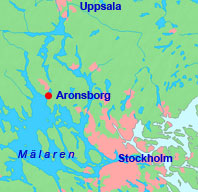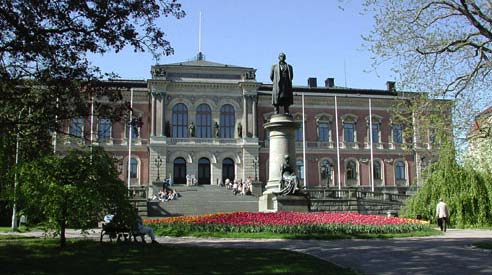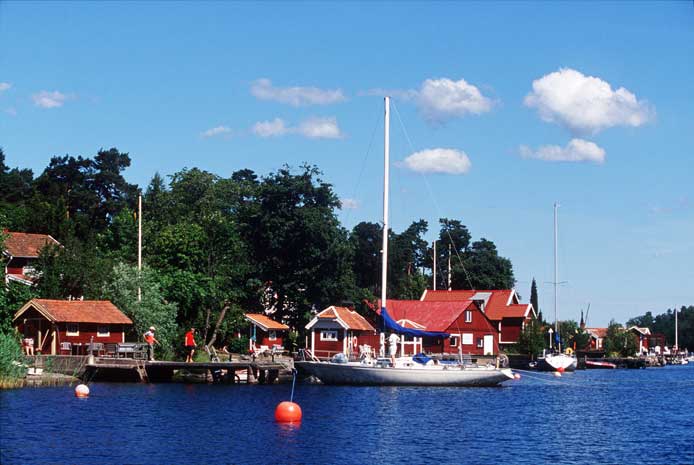
| The 2006 European School of High-Energy Physics | 
|
|---|

| The 2006 European School of High-Energy Physics | 
|
|---|
|

Aronsborg near Stockholm, Sweden
|
|---|
The 2006 European School of High-Energy Physics (formerly the CERN-JINR School of Physics) will be jointly organized by the Joint Institute for Nuclear Research (JINR), Dubna, Russia, and the European Organization for Nuclear Research (CERN), Geneva, Switzerland together with the University of Uppsala, Sweden.
The basic aim of the School is to teach various aspects of high-energy physics, but especially theory and phenomenology, to PhD students in experimental High Energy physics, mainly from the Member States of CERN and of JINR. However, the school is also open to a limited number of young PhD students in HEP phenomenology.
The Schools of Physics are designed to give a survey of up-to-date information, rather than to be a training course. An outline of each of the lecture courses and reading lists will be published on the web. It should be noticed that some pre-knowledge of the subjects is necessary in order to be able to profit fully from the lecture courses.

Uppsala University
School Poster in jpg format: 300kB
|
|
|
|---|
The closest town, Bålsta, is about 2 km away from Aronsborg. Many people from the Stockholm area come to Bålsta for weekends, and many have build summer residences there. Due to its attractive situation close to the large Mälaren lake several medieval castles were build in the area.

Summer houses at the lake Mälaren
Another interesting town close to Aronsborg is Sigtuna which, in fact, is the earliest still existing Swedish town, and where its main street has been in use since 980 AD!
In Sigtuna one can see Runic stones erected during the 11th century by wealthy citizens and merchant guilds, and with a total of over 150 runic inscriptions, it is more than can be seen in any other town in Sweden.
|
|
|
|---|
|
|
|
|---|
| Field Theory and Standard Model | A. Pich - Univ. Valencia |
| QCD | G. Ingelman - Uppsala Univ. |
| Flavour Physics and CP Violation | I. Bigi - Univ. Notre Dame, US |
| Beyond the Standard Model | R. Rattazzi - CERN |
| Neutrino Physics | B. Kayser - Fermilab |
| Astrophysics and Cosmology | V. Rubakov - INR Moscow |
| Heavy-Ion Physics | L. McLerran - BNL |
| Monte Carlo Generators | T. Sjöstrand - Lund Univ. |
| ICE CUBE/Amanda | O. Botner - Uppsala Univ. |
| Linnaeus’ Search for Order | M. Manktelov - Uppsala Univ. |
| Detectors for the Future | T. Ekelöf - Uppsala Univ. |
There will be 32 lectures in all, each lasting about 75 minutes,
with additional time for questions and discussion.
Students will be encouraged to present their current research work in the form of a special poster session which is planned for Thursday, June 22.
|
|
|
|---|
| J. Rathsman | Uppsala Univ. |
| L. Lönnblad | Lund Univ. |
| A. Pivovarov | INR Moscow |
| A. Arbuzov | JINR |
| S. Pascoli | CERN |
| G. Corcella | Rome Univ. |
|
|
|
|---|
|
|
|
|---|
|
|
|
|---|
Stockholm airport, Arlanda, is only 45 km away from Aronsborg. There are regular buses every hour from Arlanda to Bålsta. On the day of arrival a pick-up service will be organized.
More and up-to-date information about train/bus schedules, pick-up service, etc. will be posted at this web page in an upcoming announcement.
![]() Cost
Cost
![]()
The cost of the School will be around 1850 Swiss Francs per student, and will cover tuition, board and lodging from dinner on Sunday June 18 to breakfast on Saturday July 1, 2006, as well as coffee, tea or cold drinks during the morning and afternoon breaks and some social activities. It does not include travel expenses from participants' home institutes to Aronsborg and back.
For participants from JINR and CIS there are special arrangements for paying the School Fee and for travel.
For further information, please contact the JINR Organizing Secretary, Mrs. T.S. Donskova
(see Enquires and Correspondence below).
INTAS (the International Association for the Promotion of Cooperation with Scientists from the Independent States of the former Soviet Union) is providing funds for students working in former Soviet Union countries.
Details concerning the method of payment of the Fee will be sent together with the acceptance letters.
![]() Participation
Participation
![]()
The School is open to young physicists, preparing a PhD or equivalent in high-energy physics, with at least one year's experience working as experimentalists or phenomenologists. The number of students will be about 100, mostly from the CERN and JINR Member States, but a few may come from other countries which are not members. Personal contacts and informal discussions among the participants during leisure time are an important aspect of the School. For this reason, participants are asked to note that they should not be accompanied by family members or friends.
![]() Application
Application
![]()
Applications to attend the School should include:
|
Local Organizing Committee:
International Advisors:
All enquiries and correspondence related to the School of Physics
should be addressed to one of the Organizing Secretaries:
| Danielle Métral Schools of Physics CERN/DSU CH-1211 GENEVA 23 Switzerland |
Tatyana Donskova International Department Joint Institute for Nuclear Research RU-141980 Dubna, Moscow Region Russia |
| Tel: +41 22 767 9141 | Tel: +7 09621 63448 |
| Fax: +41 22 767 5460 | Fax: +7 09621 65599 |
| E-mail: physics.school@cern.ch | E-mail: phs@jinr.ru |